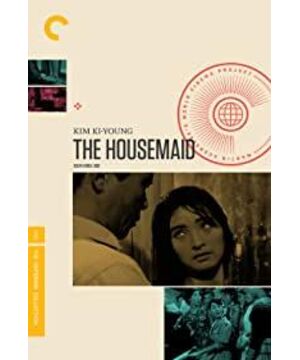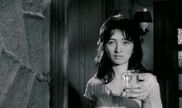Lin Changshu changed the weak and fragile middle-class family in Jin Qiyong's "Lady" into a luxurious and cruel upper class, and the inferior girl (ie the maid) from the bottom of the society completely became a foolish image of a victim who was tempted. The suspense of conflict and confrontation between the characters' relationships no longer exists, and this is precisely the most exciting part of Jin Qiyong's version of "The Girl". While the old version of the film remains critical of social reality, it uses an ingenious structure to expose the distorted and suppressed sexual fantasy of middle-class men, while the empty and gorgeous manor in the new version isolates all the influence of the external world, which is far from reality and has nothing to do with the heart . So the new version of "Secret Girl" can only become a mediocre film mixed with clichéd accusations and erotic gimmicks, and even the final "revenge" is a scratch.
Jin Qiyong's "Secret Girl" is obviously a typical middle-class thriller. It tells the moral story of a middle-class man who has a relationship with a lower-class woman who has penetrated into the family, eventually leading to the collapse and destruction of the entire middle-class family. Among them, the image of the middle-class literary man (piano teacher) is passive and cowardly. His sexuality is deeply suppressed by social morality. The whole life that a middle-class family has worked so hard to build. The middle class does not have nothing like the bottom, nor does the upper class have deep capital to bear mistakes. The prosperity and happiness of the middle class represented by the seemingly stable big house may be threatened at any time by external forces - external social unrest or the sexual temptation of a woman. The film was shot in 1960, when South Korean society was in a period of turmoil. So this story has a hint of political current situation.
When confessing his infidelity, the pianist turns to accuse his wife of material pursuits. It seems that the comfortable big house has become the crux of the opportunity for foreign intruders. The man's reason seems ridiculous and irresponsible, but it also points out the two sides of the so-called stability of the middle class: on the one hand, it is the stability of living materials, and on the other hand, it is because of having a certain living material, it must maintain a stable mentality. . The more you have, the more you are afraid of losing, and the more you are afraid of losing, the more you want to have. We often say that a stable society should have a diamond-shaped structure, with the rich and the poor occupying the top and bottom of the society respectively. A middle class with the majority is undoubtedly the cornerstone of social stability. They are buffer zones of social conflict, bearing the brunt of more harm in conflict and turmoil. However, if the middle class fails to occupy the majority of the society, with external dangers and internal crises, then the middle class is obviously a weak and fragile group. Faced with the continuous encroachment and control of the foundation of the family by the next woman, they can only choose to give in and compromise on the premise of preserving the family (even if it is only a beautiful illusion).
As a female image of a middle-class family, the wife is at the center of the conflict, always standing in front of the man, seemingly strong. When she learned that the next daughter was pregnant, her first thought was that the child could not be born, otherwise the family would collapse. However, in the face of the daughter's murder of his son, the man was so excited that he wanted to break the bank, but the wife had to maintain the family and stop it. Later, the next girl forced her husband to sleep with her upstairs. She not only agreed but also persuaded her to do it. She started sewing again, saying that she would work harder for her future life. We can see that the character of the wife is tragic, but at the same time dark and ridiculous. As a representative of traditional women (who always wear traditional Korean clothes), it seems that her only logic of thinking is "family first", even if the family has been broken into such a field, she has no choice but to try to maintain the illusion of beauty. This is Jin Qiyong's bitter mockery of the middle class.
Paying attention to the image of the next woman, we can see the simple and strong primitive desire that is completely different from the middle class. This girl from the bottom has a worldly wildness from the start, unlikable in appearance and behavior, and noticeably lacking in sexual appeal compared to her competitors. But she wins in the clarity and directness of her desire. Jin Qiyong almost treated her as an image of a destroyer. What she pursued was simply to obtain, and she never thought of maintaining any stability and lasting.
Jin Qiyong's "Secret Girl" has a Hitchcock-esque opening, which is extremely impressive. The different views of middle-class couples on the issue of maids lay suspense for the direction of the movie's plot. Then, under the tense and paradoxical atmosphere of music, the camera was aimed at the fast-changing game of the two children, indicating that confrontation was the main theme of the whole film. Jin Qiyong is obviously influenced by American film noir, and the elements of femme fatale that are common in film noir can also be seen from the lower girl. But what's interesting is that compared to the sloppy and wild girl, the female worker student dressed in Western fashion is more in line with the typical image of a femme fatale. She encouraged her companion to confess, but her companion was humiliated and left, and eventually died of illness in her hometown; she privately sponsored the daughter's money, which facilitated the daughter's invasion; after her companion's funeral, she failed to confess to the man, so she wanted to frame her. But this Western snake and scorpion from a civilized society lost to the wild and direct daughter in the competition. This may be a compromise product caused by the dual influence and mutual distortion of men's sexual repression and sexual fantasy, just like the realization of Freud's theory of the "mechanism of dreams". Or maybe it's just that the raw desires, unpolished, are more violent.
At the end of the film, it returns to the scene at the beginning, as if nothing happened, and the man directly faces the camera to issue a moral warning. Like the structure of Huangliangyi's dream, it can be seen as a dream of a middle-class man's secret venting sexual fantasies. All the women in the film love him to the death, but due to the censorship mechanism of dreams (severe repression of social morality and the fear of self-destruction), the situation that was originally a dream has all turned into a nightmare. So the expressionistic environmental reactions (trees struck by thunderstorms and lightning), as well as the poignant reflections on death and the over-the-stage emotional catharsis, are all oozing with a well-played sense of black humour.
Jin Qiyong produced a Hitchcock-style family ethics drama in South Korea in the 1960s. In it, you can see the influence of American noir films and brew black humor in a serious and thrilling atmosphere. The technical form and rich extension of content, as well as the revelation of the unease ingrained in the middle class, are astounding. (For magazine manuscripts, please do not reprint)
View more about The Housemaid reviews






